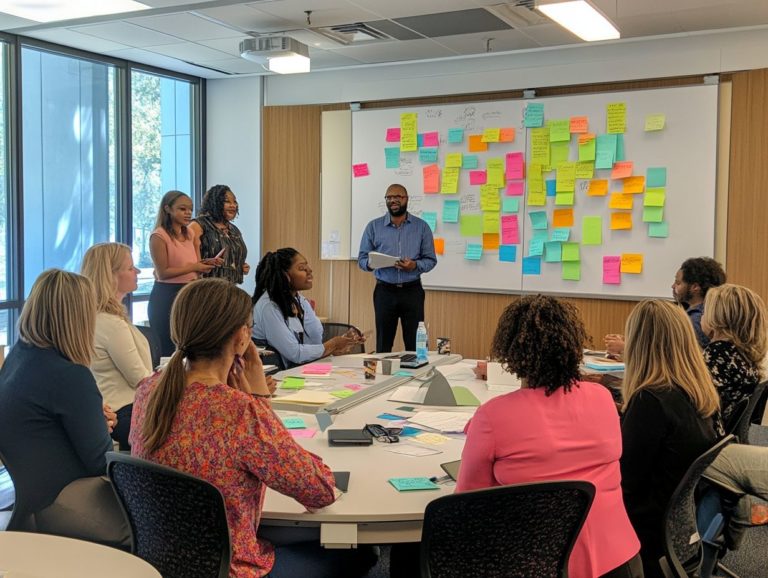5 Quick Tips for Aspiring Leaders
Leadership is a journey adorned with challenges, growth, and invaluable lessons. Whether you re embarking on this path for the first time or seeking to refine your existing skills, grasping the essence of effective leadership is essential.
This article presents five practical tips designed to guide you on your leadership journey from finding a mentor to embracing failure as a valuable learning opportunity. You’ll also discover the key qualities that define successful leaders, common pitfalls to steer clear of, and ways to maintain a healthy work-life balance.
Ready to boost your leadership skills? Dive in!
Contents
- Key Takeaways:
- 1. Find a Mentor
- 2. Continuously Educate Yourself
- 3. Practice Good Communication Skills
- 4. Lead by Example
- 5. Embrace Failure and Learn from It
- What Makes a Good Leader?
- Frequently Asked Questions
- What are some quick tips for aspiring leaders?
- How can having a clear vision benefit aspiring leaders?
- Why is effective communication important for aspiring leaders?
- How can aspiring leaders continuously seek self-improvement?
- Why is it important for leaders to lead by example?
- How can aspiring leaders build strong relationships with their team members?
Key Takeaways:

- Find a mentor who can provide guidance and support on your leadership journey.
- Continuously educate yourself on leadership skills and techniques to stay current and adaptable.
- Practice good communication skills to effectively convey your vision and inspire others.
1. Find a Mentor
Finding a mentor is an important step in your leadership journey. Good leaders recognize the immense value of guidance and support when it comes to personal growth and professional development.
A mentor can offer you lots of knowledge and experience, along with constructive feedback that helps refine your leadership style and expand your influence within your team.
By cultivating a relationship built on trust and open dialogue, you can gain invaluable insights that pave the way for your career success.
Mentorship is crucial in shaping essential leadership qualities, particularly emotional intelligence the ability to understand feelings and effective communication skills. For instance, Barack Obama often attributes his ability to navigate complex decisions to the mentors who guided him, enhancing his connection with diverse audiences. The Dalai Lama also emphasizes the significance of empathy an attribute nurtured through mentorship.
By working alongside seasoned professionals, you can mirror these qualities, fostering a more harmonious workplace while empowering yourself to inspire those around you. Ultimately, the mentorship experience serves as a powerful catalyst for your personal and professional transformation.
2. Continuously Educate Yourself
Continuous education is essential for you as an effective leader, as it nurtures learning and equips you with the skills to inspire others while adapting to ever-shifting workplace cultures.
Engaging in structured training programs helps you deepen your understanding of effective management techniques. Don’t underestimate the power of informal learning; whether through mentorship, networking, or self-directed projects, these experiences can provide you with invaluable insights.
Attending leadership summits and workshops is a strategic move, allowing you to connect with seasoned professionals and gain exposure to diverse perspectives and innovative strategies. Honing your public speaking skills is vital. It enhances your communication abilities and helps you convey your ideas with clarity and confidence key attributes for anyone aspiring to lead effectively.
3. Practice Good Communication Skills
Practicing good communication skills is essential for any aspiring leader; strong communication fosters a feedback culture, builds trust among team members, and enhances overall team motivation.
By actively engaging in open dialogue and demonstrating active listening, you can create a space where your team members feel valued and understood. This approach encourages collaboration and cultivates a sense of belonging, reinforcing the team’s commitment to shared goals.
As a good leader, you understand the importance of providing constructive feedback. This not only aids individual growth but also promotes a culture that embraces learning from mistakes. When your employees know their voices are heard and their input truly matters, it strengthens relationships and contributes to a positive workplace environment.
4. Lead by Example

Leading by example is the hallmark of effective leadership, inspiring you and your team members to embody the same values, work ethic, and commitment to excellence that a true leader exemplifies.
This approach cultivates a culture where you are empowered to emulate those positive behaviors, fostering a sense of unity and purpose within your group.
Humility in leadership is crucial. When you acknowledge your limitations and genuinely appreciate your team’s contributions, it builds trust and encourages open communication.
Take, for instance, leaders like Satya Nadella at Microsoft. He has modeled humility by prioritizing employee feedback and promoting a growth mindset. This not only strengthens relationships within the team but also boosts morale, making every member feel valued and engaged.
The result? A collaborative environment where everyone works towards common goals with enthusiasm and commitment.
5. Embrace Failure and Learn from It
Embracing failure isn’t a sign of weakness; it’s an important lesson in leadership. This mindset invites you to take risks and learn from helpful feedback, fostering growth not just within yourself, but also within your teams.
Consider Thomas Edison, whose relentless experimentation ultimately led to the invention of the lightbulb. Each setback was viewed as a stepping stone rather than a hurdle, a philosophy that has inspired countless individuals.
Similarly, J.K. Rowling encountered numerous rejections before ‘Harry Potter’ blossomed into a global phenomenon. These challenges shaped her journey to success and instilled a determination that resonates with aspiring leaders today.
By reframing failure as an opportunity, you can demonstrate to others that every defeat carries the potential for valuable insights, paving the way for stronger future endeavors.
What Makes a Good Leader?
A truly effective leader embodies a distinct blend of leadership qualities that allow you to motivate team members, communicate with clarity, and cultivate a positive workplace culture, ultimately unlocking your own leadership potential.
This blend often includes emotional intelligence, the ability to understand and manage your own emotions and those of others, enabling you to empathize with your team members and address their concerns with genuine understanding and care.
Take Dr. Bernice King as an example; her unwavering advocacy for social justice illustrates this quality beautifully. She listens intently to community voices and exemplifies the principles of compassion and respect.
George W. Bush displayed remarkable communication skills during his presidency, frequently addressing the nation directly in times of crisis. This approach created a strong feeling of unity and comfort among citizens.
By embodying such attributes, you can create an environment where teamwork flourishes, encouraging everyone to invest their best efforts towards shared goals.
What Are the Key Qualities of a Successful Leader?
Successful leaders possess key qualities such as emotional intelligence, adaptability, and a commitment to personal growth, enabling you to connect with your team and inspire peak performance.
These attributes are essential, not only for cultivating a positive work environment but also for driving collective success. Emotional intelligence allows you to understand and manage your own emotions while empathizing with the feelings of others, fostering deeper connections within your team.
Adaptability allows you to navigate the ever-changing business landscape, enabling you to make swift decisions without compromising team morale. A commitment to personal growth demonstrates your willingness to learn from experiences, setting a powerful example for those around you.
Aspiring leaders can significantly enhance these qualities through mentorship, where experienced professionals guide you through real-world scenarios and provide invaluable feedback, ultimately shaping you into an effective and inspiring leader.
Start exploring mentorship opportunities today to enhance your leadership skills and inspire others!
How Can One Develop Their Leadership Skills?

Developing your leadership skills demands a proactive approach. Actively seek out learning opportunities, embrace mentorship, and engage in leadership programs to nurture essential qualities that define effective leadership.
This journey can take many forms. Attend workshops that hone your communication and decision-making abilities. Participate in internships that offer hands-on experience. Networking with seasoned leaders can provide invaluable insights that shape your growth. Each avenue broadens your knowledge base and allows you to apply your skills in real-world situations.
The impact of having a mentor is profound. They offer personalized feedback and guidance, helping you navigate challenges and refine your strategies.
By adopting this multifaceted approach, you ensure well-rounded development that prepares you to excel in leadership roles.
What Are the Common Mistakes Aspiring Leaders Make?
Aspiring leaders often trip over common pitfalls. They may neglect to seek feedback, fail to communicate their vision effectively, and underestimate the power of emotional intelligence. To avoid these missteps and enhance your skills, consider exploring 5 ways to enhance leadership communication skills, as these can significantly improve your growth trajectory.
By overlooking these vital elements, you may find it challenging to forge strong relationships with your team, leading to disengagement and low morale. Cultivating a feedback culture is essential; it promotes open dialogue and allows you to refine your approach.
Actively seeking constructive criticism helps you uncover blind spots and showcases your vulnerability, which can build trust among team members.
Honing your emotional intelligence is crucial for connecting with others and nurturing a collaborative environment. It paves the way for both personal fulfillment and professional success.
How Can One Handle Conflict as a Leader?
Handling conflict as a leader requires you to harness strong communication skills and emotional intelligence. These abilities enable you to navigate challenging situations while keeping your team motivated and cohesive.
Effective conflict resolution starts with active listening. Fully engage with the perspectives of everyone involved. By creating an environment that encourages open dialogue, you foster a space where team members feel valued and heard.
Take, for example, renowned leaders like Nelson Mandela. He embodied this approach in his quest to unify a divided South Africa. His efforts led to constructive discussions and fostered reconciliation.
These techniques not only defuse tension but also promote understanding. This ultimately results in a more cohesive and motivated team, ready to tackle future challenges together.
How Can One Maintain a Work-Life Balance as a Leader?
Maintaining a work-life balance is essential for you as a leader. It shapes your leadership style and influences your ability to set personal goals and foster a sense of team spirit.
When you effectively manage your time and prioritize self-care, you create a positive ripple effect throughout your organization. By modeling this balance, you encourage your team to adopt similar practices, leading to enhanced productivity and morale.
Implement strategies like setting clear boundaries, promoting open communication, and scheduling regular breaks. These can cultivate an environment where everyone feels valued and supported. A leader who prioritizes self-care is often more resilient and better equipped to tackle challenges, ultimately guiding their team toward collaborative success and improved performance.
Frequently Asked Questions

What are some quick tips for aspiring leaders?
1. Create a clear vision: Set realistic goals for yourself and your team.
2. Communicate effectively: Actively listen to your team’s ideas and feedback.
3. Seek self-improvement: Be open to learning from others.
4. Lead by example: Maintain a positive attitude in all situations.
5. Build strong relationships: Foster a culture of trust and collaboration.
Start your leadership journey today! Explore more resources to enhance your skills.
How can having a clear vision benefit aspiring leaders?
Having a clear vision gives direction and purpose to your leadership. It helps you make decisions and prioritize tasks effectively.
Moreover, it motivates your team to work towards a common goal. A clear vision also enables better communication and alignment within the team.
Why is effective communication important for aspiring leaders?
Effective communication is crucial for aspiring leaders! It allows them to share their ideas and what they expect from the team.
Additionally, it helps build trust and fosters a positive work environment. Active listening is a key part of effective communication, allowing leaders to understand their team’s perspectives and address any concerns or issues.
How can aspiring leaders continuously seek self-improvement?
Aspiring leaders should have a growth mindset and constantly look for ways to improve themselves. This can include attending workshops or training programs, reading books or articles on leadership, and implementing strategies for developing future leaders by seeking feedback from mentors or colleagues.
Self-reflection on their own strengths and weaknesses is also valuable.
Why is it important for leaders to lead by example?
Leaders are role models for their teams! Their actions often speak louder than their words.
By leading by example, leaders set a standard of behavior for their team to follow, such as being punctual, displaying a positive attitude, and practicing what they preach.
How can aspiring leaders build strong relationships with their team members?
Building relationships takes time and effort, but it is essential for aspiring leaders to have a strong rapport with their team members.
This can be achieved by showing genuine interest and care for their well-being, actively listening to their concerns, and providing support and recognition for their efforts.
Regular team-building activities can also help strengthen relationships within the team.






